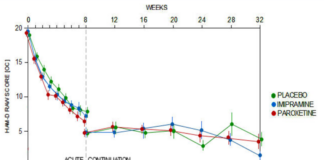Tag: antidepressant side effects
Researchers Accuse Lancet Article and British Psychiatrists of Minimising Antidepressants’ Withdrawal...
A response to a seriously flawed review.
Giving Caregivers a Platform: Meagan, Mother of Matt
A mom describes her son's descent into the harms of psychiatry—and his way out. "It was really difficult to watch Matt decline. He had given up hope that he could get well."
What Is the Risk of Permanent Sexual Dysfunction from Antidepressants?
Males taking antidepressants were at 100 times the risk of erectile dysfunction compared with the healthy population and more than three times the risk even after controlling for other variables.
Understanding the Neurobiology of Post-SSRI Sexual Dysfunction
Post-SSRI sexual dysfunction (PSSD) may be a common adverse effect of antidepressants. Researchers are now attempting to understand the neurobiology behind it.
When Your Antidepressant Isn’t as Safe as You Think
In this piece for Psych Central, Dr. Viatcheslav Wlassoff discusses some of the safety issues and adverse effects of antidepressants.
"When it comes to side effects, anticholinergic...
Irving Kirsch: The Placebo Effect and What It Tells Us About...
Dr Irving Kirsch is Associate Director of the Program in Placebo Studies and lecturer in medicine at the Harvard Medical School and Beth Israel Deaconess Medical Center. He joins us this week to discuss his research into the placebo effect and what it tells us about the efficacy of antidepressant drugs.
Will Hall: A Harm Reduction Approach to Mental Health and Wellbeing
Will is a mental health advocate, counsellor, writer, and teacher. Will advocates the recovery approach to mental illness and is recognised internationally as an innovator in the treatment and social response to psychosis.
Mo Hannah: Changing the Teaching of the Biological Model
Maureen Hannah, a Professor of Psychology at Siena College, New York, tells of experiences with the psychiatric system, both personally and professionally, and how poor care in the mental health system led to an unexpected and devastating family loss.
John Read: The Epidemic of Psychiatric Overprescribing
Professor John Read of the University of East London talks about the overuse of psychiatric medications and the alarming growth in the prescribing of antidepressants, benzodiazepines and other psychoactive medications.
Peter Gøtzsche: The Pharmaceutical Manufacturers Dominance of Mental Healthcare
Professor Peter Gøtzsche is Director of the Nordic Cochrane Centre in Denmark and discusses his background in research, his views on antidepressant prescribing and how pharmaceutical manufacturers have influenced mental healthcare.
Robert Whitaker: The Astonishing Rise of Mental Illness in America
We discuss Robert's 2010 book, Anatomy of an Epidemic, which is arguably the definitive account of the realities of psychiatric drugs and completely lays bare the astonishing rise in mental ill health despite the availability of psychiatric drugs.
David Healy: Making Medicine Safer for All
Doctor David Healy from Bangor University in Wales talks about prescribing practice, medicine safety and pharmaceutical regulation.
Terry Lynch: Why Psychiatry Has Pursued a Purely Medical Approach to...
Doctor Terry Lynch is a GP, psychotherapist, author and mental health educator. Ten years into his career as a GP, he became very concerned about the medical approach to emotional and mental suffering and was not prepared to remain silent.
This is What it’s Really Like to Date on Antidepressants
In this essay for Women's Health, one woman shares her experience of dating while on antidepressants. While antidepressants alleviated her anxiety, they also dulled...
We Need to pay Better Attention to Medication Side Effects
From KevinMD.com: Doctors often fail to recognize that their patients' symptoms are side effects of medication.
"Cognitive dissonance, a universal human phenomenon, is based on the assumption...
Is Society or Psychiatry to Blame for the “Seriously Mentally Ill”...
Adults in the U.S. diagnosed with “serious mental illness” die on average 25 years earlier than others. This is not controversial, as establishment psychiatry and its critics agree. What is controversial is who is to blame?
Antidepressants Increase the Risk of Suicide and Violence at All Ages
Although the drug industry, our drug regulators and leading psychiatrists have done what they could to obscure these facts, it can no longer be doubted that antidepressants are dangerous and can cause suicide and homicide at any age.
What’s the Harm in Taking an Antidepressant?
We know that all drugs have side effects. That’s just part of the deal right? But is it really possible that an antidepressant can cause a sane person to act like a cold-blooded criminal?
$11.9 Million Paxil Suicide Verdict: The Inside Story
The judicial system and the public are becoming increasingly aware of the hazards of psychiatric drugs, including their capacity to make people behave in ways that are harmful to themselves and others, and contrary to their past behavior and character.
Study 329 Taper Phase
Most doctors still affect surprise at the idea SSRIs might come with withdrawal problems. Regulators knew very clearly since 2002 about the problems, but have decided to leave any communication of these issues in company hands.
Study 329 Continuation Phase
All the fuss about Study 329 centers on its 8-week acute phase. But this study had a 24-week Continuation Phase that has never been published. Until Now.
Violence Caused by Antidepressants: An Update after Munich
The media is now reporting details about the 18-year-old who shot and killed nine and wounded many others before killing himself on July 22 in Munich. My clinical and forensic experience leads to a distinction among people who murder under the influence of psychiatric drugs. Those who kill only one or two people, or close family members, often have little or no history of mental disturbance and violent tendencies. The drug itself seems like the sole cause of the violent outburst. On the other hand, most of those who commit mass violence while taking psychiatric drugs often have a long history of mental disturbance and sometimes violence. For these people, the mental health system seems to have provoked increasing violence without recognizing the danger.
Rising Rates of Suicide: Are Pills the Problem?
If you’ve read recent reports that state “US suicide rates surge to a 30 year high,” you might first justify the reality with the fact that things feel very wrong in our world today. On a personal, national, and planetary level, people are suffering to survive and the distress is coming from all sides – medical to economic to existential. But you probably also wonder why more people are choosing this permanent and self-destructive path, and feel compelled to submit to seemingly logical appeals to provide these individuals more help and greater access to treatment. Surprise: that may be the last thing our population of hopeless and helpless needs. Life’s inevitable challenges are not the problem. It’s the drugs we use that are fueling suicide.
My Pharmaceutical Reincarnation
I lost almost four years of my life, and I’ve not a doubt that it was due to those “life-saving” pills. To that end, they did work. At a time when I was doubled-over with depression, those four prescriptions kept me alive. But then they killed me slowly and brought me back as a stranger.
Moving Forward in the Science of Psychiatric Medication Discontinuation/Reduction
This week Live & Learn launched a research study on the experience of people labeled with mental disorders who have tried to stop taking psychiatric medications. This project -- the Psychiatric Medication Discontinuation/Reduction (PMDR) Study -- aims to understand the process of coming off psychiatric medications in order to better support those who choose to do so. The study seeks to answer the question: What helps people stop their psychiatric medications? What gets in the way of stopping?






























